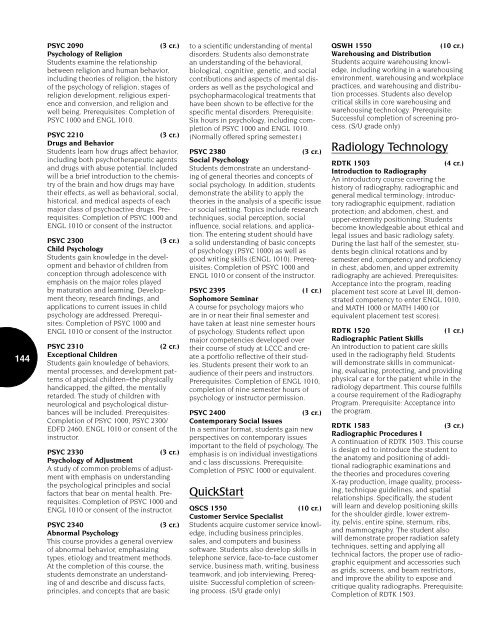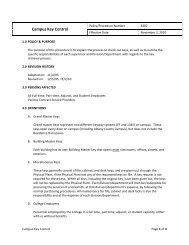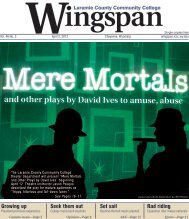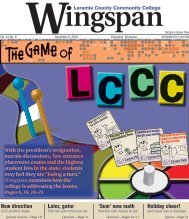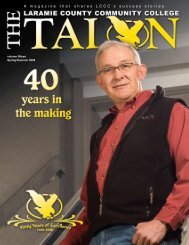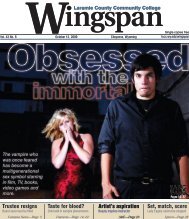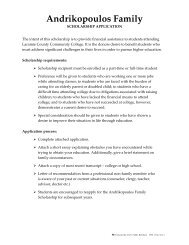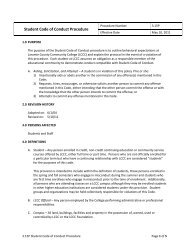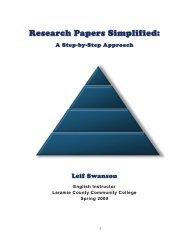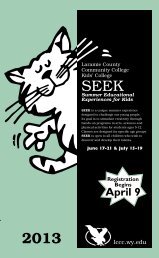LCCC policy - Laramie County Community College
LCCC policy - Laramie County Community College
LCCC policy - Laramie County Community College
Create successful ePaper yourself
Turn your PDF publications into a flip-book with our unique Google optimized e-Paper software.
144<br />
PSYC 2090<br />
(3 cr.)<br />
Psychology of Religion<br />
Students examine the relationship<br />
between religion and human behavior,<br />
including theories of religion, the history<br />
of the psychology of religion, stages of<br />
religion development, religious experience<br />
and conversion, and religion and<br />
well being. Prerequisites: Completion of<br />
PSYC 1000 and ENGL 1010.<br />
PSYC 2210<br />
(3 cr.)<br />
Drugs and Behavior<br />
Students learn how drugs affect behavior,<br />
including both psychotherapeutic agents<br />
and drugs with abuse potential. Included<br />
will be a brief introduction to the chemistry<br />
of the brain and how drugs may have<br />
their effects, as well as behavioral, social,<br />
historical, and medical aspects of each<br />
major class of psychoactive drugs. Prerequisites:<br />
Completion of PSYC 1000 and<br />
ENGL 1010 or consent of the instructor.<br />
PSYC 2300<br />
(3 cr.)<br />
Child Psychology<br />
Students gain knowledge in the development<br />
and behavior of children from<br />
conception through adolescence with<br />
emphasis on the major roles played<br />
by maturation and learning. Development<br />
theory, research findings, and<br />
applications to current issues in child<br />
psychology are addressed. Prerequisites:<br />
Completion of PSYC 1000 and<br />
ENGL 1010 or consent of the instructor.<br />
PSYC 2310<br />
(2 cr.)<br />
Exceptional Children<br />
Students gain knowledge of behaviors,<br />
mental processes, and development patterns<br />
of atypical children–the physically<br />
handicapped, the gifted, the mentally<br />
retarded. The study of children with<br />
neurological and psychological disturbances<br />
will be included. Prerequisites:<br />
Completion of PSYC 1000, PSYC 2300/<br />
EDFD 2460, ENGL 1010 or consent of the<br />
instructor.<br />
PSYC 2330<br />
(3 cr.)<br />
Psychology of Adjustment<br />
A study of common problems of adjustment<br />
with emphasis on understanding<br />
the psychological principles and social<br />
factors that bear on mental health. Prerequisites:<br />
Completion of PSYC 1000 and<br />
ENGL 1010 or consent of the instructor.<br />
PSYC 2340<br />
(3 cr.)<br />
Abnormal Psychology<br />
This course provides a general overview<br />
of abnormal behavior, emphasizing<br />
types, etiology and treatment methods.<br />
At the completion of this course, the<br />
students demonstrate an understanding<br />
of and describe and discuss facts,<br />
principles, and concepts that are basic<br />
to a scientific understanding of mental<br />
disorders. Students also demonstrate<br />
an understanding of the behavioral,<br />
biological, cognitive, genetic, and social<br />
contributions and aspects of mental disorders<br />
as well as the psychological and<br />
psychopharmacological treatments that<br />
have been shown to be effective for the<br />
specific mental disorders. Prerequisite:<br />
Six hours in psychology, including completion<br />
of PSYC 1000 and ENGL 1010.<br />
(Normally offered spring semester.)<br />
PSYC 2380<br />
(3 cr.)<br />
Social Psychology<br />
Students demonstrate an understanding<br />
of general theories and concepts of<br />
social psychology. In addition, students<br />
demonstrate the ability to apply the<br />
theories in the analysis of a specific issue<br />
or social setting. Topics include research<br />
techniques, social perception, social<br />
influence, social relations, and application.<br />
The entering student should have<br />
a solid understanding of basic concepts<br />
of psychology (PSYC 1000) as well as<br />
good writing skills (ENGL 1010). Prerequisites:<br />
Completion of PSYC 1000 and<br />
ENGL 1010 or consent of the instructor.<br />
PSYC 2395<br />
(1 cr.)<br />
Sophomore Seminar<br />
A course for psychology majors who<br />
are in or near their final semester and<br />
have taken at least nine semester hours<br />
of psychology. Students reflect upon<br />
major competencies developed over<br />
their course of study at <strong>LCCC</strong> and create<br />
a portfolio reflective of their studies.<br />
Students present their work to an<br />
audience of their peers and instructors.<br />
Prerequisites: Completion of ENGL 1010,<br />
completion of nine semester hours of<br />
psychology or instructor permission.<br />
PSYC 2400<br />
(3 cr.)<br />
Contemporary Social Issues<br />
In a seminar format, students gain new<br />
perspectives on contemporary issues<br />
important to the field of psychology. The<br />
emphasis is on individual investigations<br />
and c lass discussions. Prerequisite:<br />
Completion of PSYC 1000 or equivalent.<br />
QuickStart<br />
qSCS 1550<br />
(10 cr.)<br />
Customer Service Specialist<br />
Students acquire customer service knowledge,<br />
including business principles,<br />
sales, and computers and business<br />
software. Students also develop skills in<br />
telephone service, face-to-face customer<br />
service, business math, writing, business<br />
teamwork, and job interviewing. Prerequisite:<br />
Successful completion of screening<br />
process. (S/U grade only)<br />
qSWH 1550<br />
(10 cr.)<br />
Warehousing and Distribution<br />
Students acquire warehousing knowledge,<br />
including working in a warehousing<br />
environment, warehousing and workplace<br />
practices, and warehousing and distribution<br />
processes. Students also develop<br />
critical skills in core warehousing and<br />
warehousing technology. Prerequisite:<br />
Successful completion of screening process.<br />
(S/U grade only)<br />
Radiology Technology<br />
RDTk 1503<br />
(4 cr.)<br />
Introduction to Radiography<br />
An introductory course covering the<br />
history of radiography, radiographic and<br />
general medical terminology; introductory<br />
radiographic equipment, radiation<br />
protection; and abdomen, chest, and<br />
upper-extremity positioning. Students<br />
become knowledgeable about ethical and<br />
legal issues and basic radiology safety.<br />
During the last half of the semester, students<br />
begin clinical rotations and by<br />
semester end, competency and proficiency<br />
in chest, abdomen, and upper extremity<br />
radiography are achieved. Prerequisites:<br />
Acceptance into the program, reading<br />
placement test score at Level III, demonstrated<br />
competency to enter ENGL 1010,<br />
and MATH 1000 or MATH 1400 (or<br />
equivalent placement test scores).<br />
RDTk 1520<br />
(1 cr.)<br />
Radiographic Patient Skills<br />
An introduction to patient care skills<br />
used in the radiography field. Students<br />
will demonstrate skills in communicating,<br />
evaluating, protecting, and providing<br />
physical car e for the patient while in the<br />
radiology department. This course fulfills<br />
a course requirement of the Radiography<br />
Program. Prerequisite: Acceptance into<br />
the program.<br />
RDTk 1583<br />
(3 cr.)<br />
Radiographic Procedures I<br />
A continuation of RDTK 1503. This course<br />
is design ed to introduce the student to<br />
the anatomy and positioning of additional<br />
radiographic examinations and<br />
the theories and procedures covering<br />
X-ray production, image quality, processing,<br />
technique guidelines, and spatial<br />
relationships. Specifically, the student<br />
will learn and develop positioning skills<br />
for the shoulder girdle, lower extremity,<br />
pelvis, entire spine, sternum, ribs,<br />
and mammography. The student also<br />
will demonstrate proper radiation safety<br />
techniques, setting and applying all<br />
technical factors, the proper use of radiographic<br />
equipment and accessories such<br />
as grids, screens, and beam restrictors,<br />
and improve the ability to expose and<br />
critique quality radiographs. Prerequisite:<br />
Completion of RDTK 1503.


